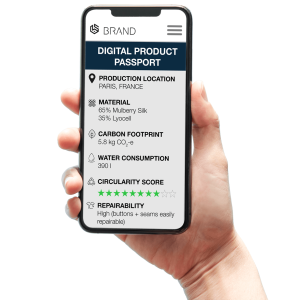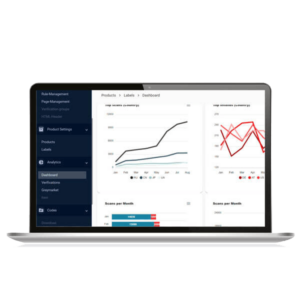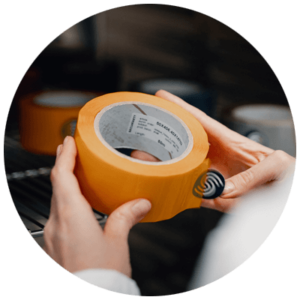FROM ESPR & PPWR TO AN AUDITABLE DATA AND LABEL WORKFLOW
THE DIGITAL PRODUCT PASSPORT


FROM ESPR & PPWR TO AN AUDITABLE DATA AND LABEL WORKFLOW
THE DIGITAL PRODUCT PASSPORT

WHAT IS A DIGITAL PRODUCT PASSPORT?
THE DPP – TRANSPARENCY ACROSS THE ENTIRE PRODUCT LIFECYCLE

A Digital Product Passport (DPP) is a structured and standardized digital record that accompanies a product, component, or material throughout its entire lifecycle.
The DPP contains essential technical, environmental, and compliance information and makes it electronically accessible – typically via a QR code, NFC, or RFID tag attached to the product.
This ensures that each product is uniquely identifiable and that key data can be accessed quickly and securely.
The Digital Product Passport (DPP) is no longer a theoretical concept within the EU regulatory landscape. With the Ecodesign for Sustainable Products Regulation (ESPR), the Packaging and Packaging Waste Regulation (PPWR), and the upcoming Battery Passport requirements, companies must move from strategy to execution.
WHY MOST DIGITAL PRODUCT PASSPORT PROJECTS FAIL
Many organizations start with the wrong question: “Which QR code should we print?”.
But a Digital Product Passport is not a static document. It is a continuously maintained data environment built on:
- Structured product data models
- Defined ownership and approval workflows
- Role-based access (public vs. authority vs. partner)
- Versioning and auditability
- Interoperable identifiers
Without this foundation, a QR Code DPP becomes a marketing landing page — not a compliance-grade infrastructure component.

One of the most underestimated design decisions is visibility control.
A robust Digital Product Passport implementation defines:
- Public View: Consumer-facing sustainability and product information
- Partner View: Logistics, distribution, and service-level process data
- Authority View: Market surveillance and regulatory access
Without this structure, organizations either expose too much data — or provide too little to be compliant.
WHAT INFORMATION DOES THE DPP INCLUDE?
PRODUCT IDENTIFICATION
- Product type, model, and variant
- Unique product or batch identifier
- GTIN or internal article number
- Economic operator(s) responsible for the product
COMPOSITION AND MATERIALS
- Bill of materials or key components
- Recycled content and critical raw materials
- Substances of concern and applicable restrictions
ENVIRONMENTAL PERFORMANCE
- Carbon footprint of other impact indicators (often cradle-to-gate and lifecycle)
- Energy and water consumption in use
- Resource efficiency, durability and reparability indicators
CIRCULARITY AND END-OF-LIFE
- Repair and maintenance instructions
- Availability of spare parts and accessoires
- Reuse, refurbishment and remanufacturing options
- Disassembly, sorting and recycling instructions
COMPLIANCE AND DOCUMENTATION
- Relevant EU and national regulations
- Conformity assessment references, certificates, test reports
- Safety warnings and labelling information
WHAT PRODUCTS NEED A DIGITAL PRODUCT PASSPORT AND WHO IS RESPONSIBLE?
Beginning with batteries, many other products will also require a mandatory product passport in the coming years.
The 2025–2030 working plan defines the first priority product groups, including:
- textiles and apparel
- mattresses
- furniture
- tyres
- iron and steel
- aluminium
- several energy-related products
Detailed DPP rules for these groups will be phased in between roughly 2027 and 2029, with at least 18 months preparation time after each delegated act is adopted.
Under EU legislation, responsibility primarily lies with the economic operator placing the product on the EU market – usually the manufacturer or importer. ESPR guidance and the CIRPASS project describe this actor as the Responsible Economic Operator (REO) for the product.
THE BATTERY PASSPORT - THE FIRST CONCRETE DPP
The EU Battery Regulation (EU) 2023/1542 already defines a Digital Battery Passport for certain industrial and electric vehicle batteries. For these, a passport becomes mandatory from 18 February 2027.
This is effectively the first fully specified DPP implementation in EU law and provides a preview of what other sectors can expect: strong traceability, detailed sustainability data and a requirement to provide information via a digital passport.


HOW SECURIKETT SUPPORTS YOUR DPP JOURNEY
Securikett’s core strengths – secure labelling, unique IDs and cloud-based product data – align naturally with DPP requirements.
Our approach focuses on open standards and modular integration so that you stay flexible as EU rules evolve.
REQUEST A SPEAKER ON THE DIGITAL PRODUCT PASSPORT
Our experts are available as speakers and panel participants on the topic of the Digital Product Passport—combining practical experience, regulatory expertise, and a clear business perspective.
Key topics covered by our speakers include:
Digital Product Passport & EU regulations
The DPP as a strategic tool for industry and B2B companies
Data structures, serialization, and traceability
Product protection, brand protection, and compliance
Creating business value through transparency and digitalization
Whether for a conference, industry event, or panel discussion, we provide well-founded insights and clear guidance tailored to decision-makers, experts, and key stakeholders.

THE DIGITAL PRODUCT PASSPORT IN USE
FACTS ABOUT DPP


































